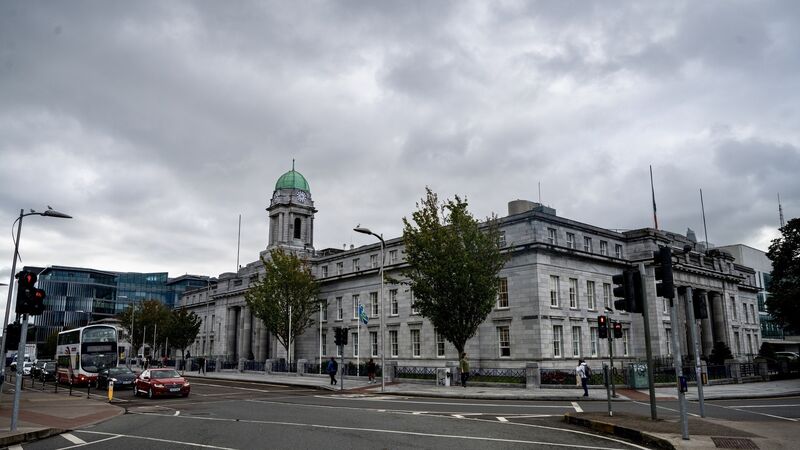Cork City Council meetings: Timekeeping, tenant in-situ scheme, and capturing loose goats

An analysis by in May showed that the Progressive Alliance, made up of the three Labour councillors, three Green, and one Social Democrats councillor, were responsible for 57% of motions discussed in full council meetings. Picture Chani Anderson
The June 2024 local elections provided a shake up of the party groupings, with several new faces elected.
Prior to the local elections, there had been seven Fianna Fáil and seven Fine Gael councillors, but the elections saw Fianna Fáil win two additional seats and Fine Gael lose two, making Fianna Fáil the largest party.
The two parties have been agreeing on fewer things than their coalition party colleagues in the Dáil have, with Fine Gael councillors sometimes siding with the smaller parties.
One example was the tenant-in-situ scheme, which allows local authorities to purchase rental properties from landlords who are selling, ensuring tenants facing eviction due to the sale can continue to rent from the authority.
In March of this year, a circular was issued by the Department of Housing, Local Government, and Heritage, headed up by Fianna Fáil TD, which said there would be a capital funding allocation of €20m for Cork city in 2025.
Alison O’Rourke, the director of the housing directorate, explained to councillors in April that “the funding received will be insufficient to adequately cover current commitments from 2024 into 2025”, adding that this is “expected to have a significant effect on homeless preventions”.
In 2024, tenant-in-situ accounted for 37.7% of homeless preventions in Cork city — including 37 single households and 51 families, comprising 87 adults and 100 children.
135 homes were acquired by the council in 2024, including 79 tenant-in-situ acquisitions. A further 33 homes were at the sale agreed stage at the end of the year, and some of those tenants have since reportedly had to go into emergency accommodation.
Further information provided by the council showed that they had been granted by the housing department to acquire more houses than initial targets set, and were expecting additional funding to be provided in 2025 to cover last year’s commitments and acquire a similar number of properties this year, but such extra funding was not provided.
A letter was sent on behalf of Cork city TDs and colleagues to the housing minister including signatures from Sinn Féin, Independent Ireland, Labour, the Social Democrats, the Green party, People Before Profit-Solidarity, the Workers Party and the city’s three independent councillors.
The majority of Fine Gael reps also signed the letter — councillors Damian Boylan, Shane O’Callaghan, Des Cahill and Gary O’Brien as well as TD Colm Burke, though South Central TD Jerry Buttimer and councillor for the North West ward Joe Kavanagh did not.
Another ongoing issue in council meetings this year which saw the two parties divided was timekeeping — council meetings are supposed to finish at 8pm but very rarely do.
Several attempts to clamp down on meetings running way over the allocated time saw multiple meetings finish before the full agenda was discussed, as councillors failed to reach a compromise.
At the March meeting, discussions around whether to continue or end the meeting took longer than the meeting would have taken to finish.
Green Party councillor Oliver Moran told at the time: “Thirty-five minutes was wasted by Fianna Fáil debating whether we had time to agree eight motions that took 27 minutes in total when we finally got to them. And half of those were actually carried over from the previous meeting, when Fianna Fáil obstructed that agenda from being completed.”
At the April meeting, councillors had agreed in advance to go to 9pm, but 9pm struck, and they were still mid debate on a motion around how to capture loose goats in the northside of the city, with four councillors waiting to speak on that motion and five motions still to be heard.
Fianna Fáil councillors suggested they would hear the next four speakers on the goats then end the meeting, while the majority of the other councillors were in favour of hearing all motions.

Fine Gael’s Shane O’Callaghan put forward a compromise, that they extend the meeting until 9.30pm and try to get everything done in that time.
As the Fianna Fáil amendment was suggested first, it had to be voted on first, and it failed to reach the two thirds majority — while in most council votes, only an ordinary majority is required, in order to suspend standing orders (to change the meeting agenda rather than agree on a motion within the meeting), two thirds of the councillors must be in favour.
Mr O’Callaghan’s amendment got 17 votes in favour, with the Fianna Fáil councillors voting against it - it needed 17.3 votes, so no agreement was reached and the meeting finished at 9.10pm without reaching the end of the goat discussion or hearing the other motions.
Fine Gael’s Shane O’Callaghan told after that meeting that he was in favour of the meetings running as long as they had to so that all business was finished, saying that local government has too few powers, and that voting to shorten their own meetings was akin to “turkeys voting for Christmas”.
After the April meeting, he said that Fianna Fáil should not have cut the meeting short:
A major issue from the Fianna Fáil side’s perspective was “non-statutory” motions at the end of the meetings, often national issues or sometimes international. They argued that given the council had no power to enact these, they were a waste of council time.
At Green Party councillor Dan Boyle’s last meeting as lord mayor in June, changes to standing orders were approved including meetings starting half an hour earlier at 5pm and rules stating each councillor can only put forward one “non-statutory” motion a month.
Cork City Councillors allocated just under €450,000 to local schools, clubs and community organisations in the city last year through council funding which allows each elected member to select local groups for grants.
In May of this year, councillors received an annual report on the allocation of ward funds last year. “Ward funds” are small grants that each councillor can allocate directly to residents’ associations, sports clubs, schools, and other community organisations in the city.
774 organisations received ward funds in 2024, and the total budget for ward funds in 2025 is €449,500, meaning a similar number of organisations will likely be supported.
The purpose of ward funds is to direct funding towards very local organisations in each ward, with restrictions in place as to how councillors allocate the funds outside of their ward.
Green Party councillor Oliver Moran put together an analysis of ward funding across the five local electoral areas, and found that overall, 774 grants were allocated in 2024; 170 in the North West ward, 164 in North East, 167 in South West, 153 in South Central and 120 in South East.
Each of these received an average of €572, and each councillor allocated an average of €14,288, with a total of €442,919 allocated.
Ward funds can be allocated towards the provision of skips in local areas for local clean-ups and other uses. For that reason, Panda was the single largest recipient of ward funds in 2024, nominally receiving €36,903, with skips provided to local areas for use by the community.
More than half of all skips hired were in the South East ward, with €18,772 spent on this purpose.
Aside from skip hire, the top 10 community organisations that received ward funds were the Teddy McCarthy Memorial Fund (€4,150), Cork Masters Swimming Club (€4,075), City of Cork Male Voice Choir (€3,500), Bishopstown Tidy Towns (€3,200), Mayfield Men’s Shed (€3,180), Mayfield East Community Association (€3,100), Togher Tidy Towns (€2,850), Ballincollig Tidy Towns (€2,800), Ballincollig AFC (€2,800) and The Cork Pride Festival (€2,750).
Mr Moran said: “Ward funds are a really accessible way for community organisations to access small funding for local projects or the holding of events. They’re administered by individual councillors, which means there’s a great variety and local touch in the emphasis of where they get allocated.
“Many councillors allocate the funds early in the year. I’m one of those that hold it back and try to spread it out during the year to different groups. So if there’s a group in the North East ward who has a project they want financial help with, just let me know.”







 App?
App?


